牛津译林版初中英语八下Unit 5 Good manners Reading2课件 (共22张PPT)
文档属性
| 名称 | 牛津译林版初中英语八下Unit 5 Good manners Reading2课件 (共22张PPT) |
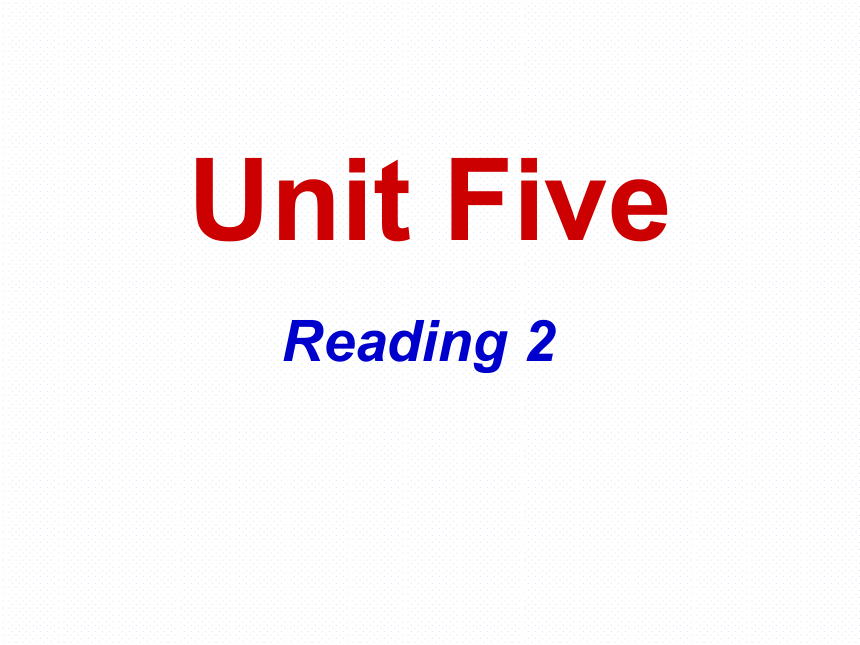
|
|
| 格式 | zip | ||
| 文件大小 | 72.8KB | ||
| 资源类型 | 教案 | ||
| 版本资源 | 牛津译林版 | ||
| 科目 | 英语 | ||
| 更新时间 | 2018-04-08 00:00:00 | ||
图片预览

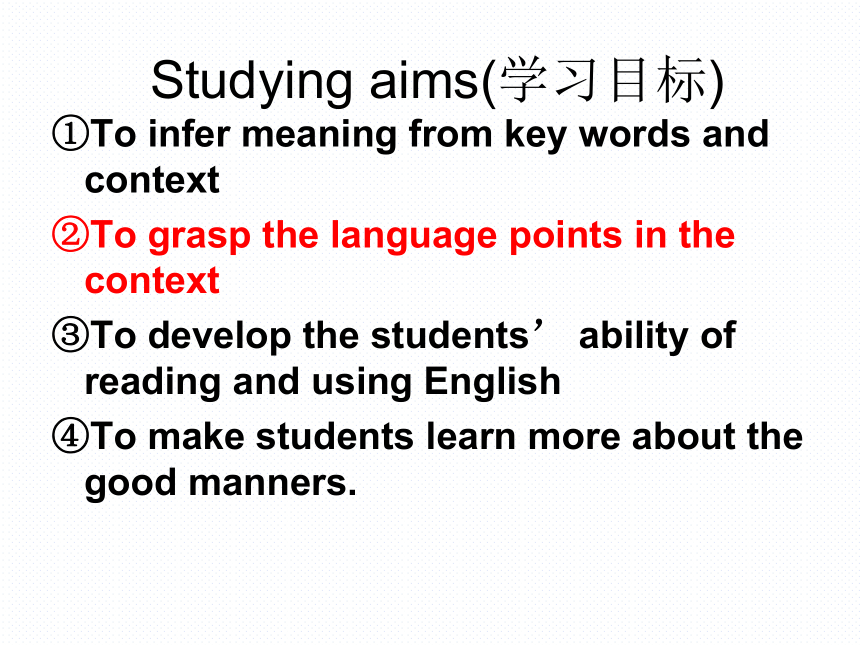
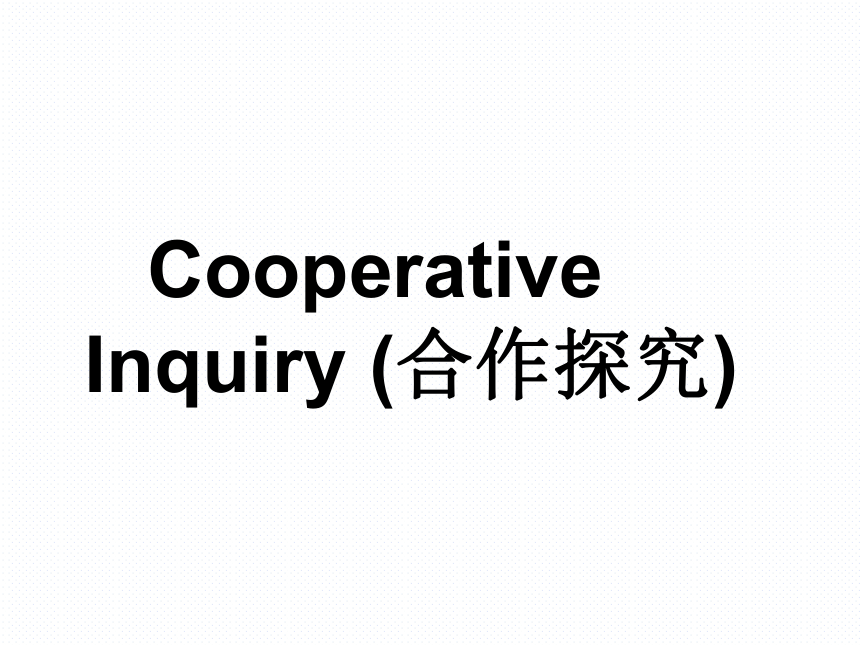
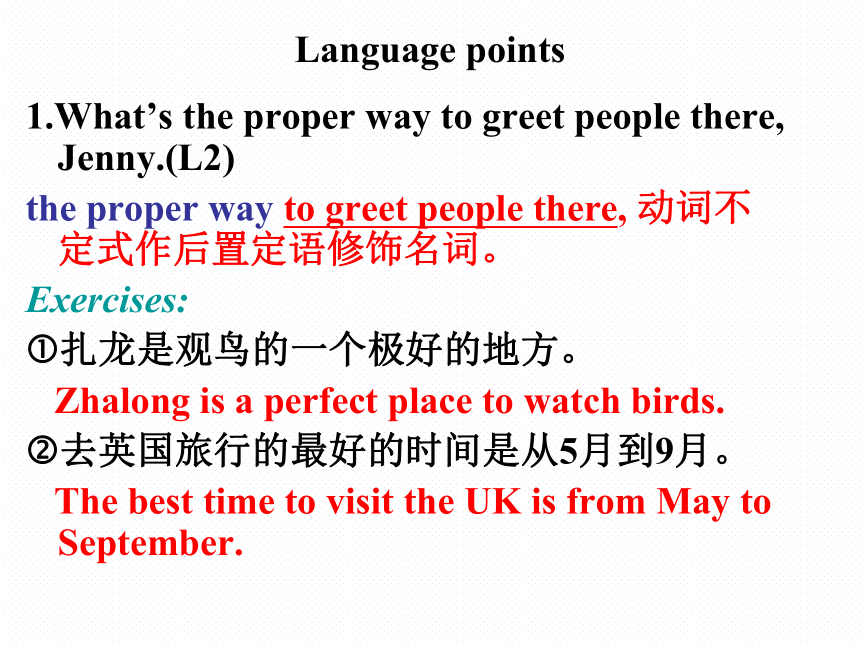
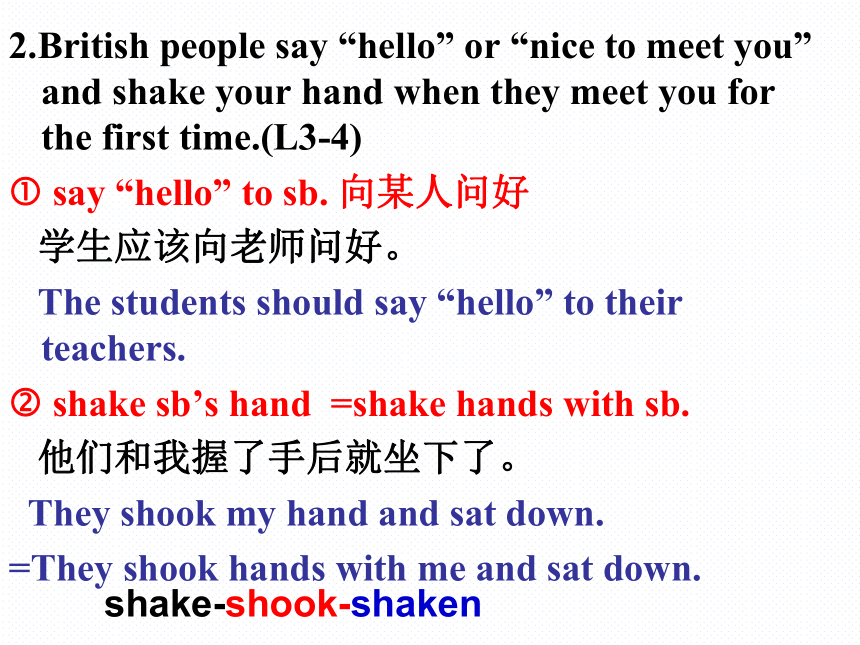
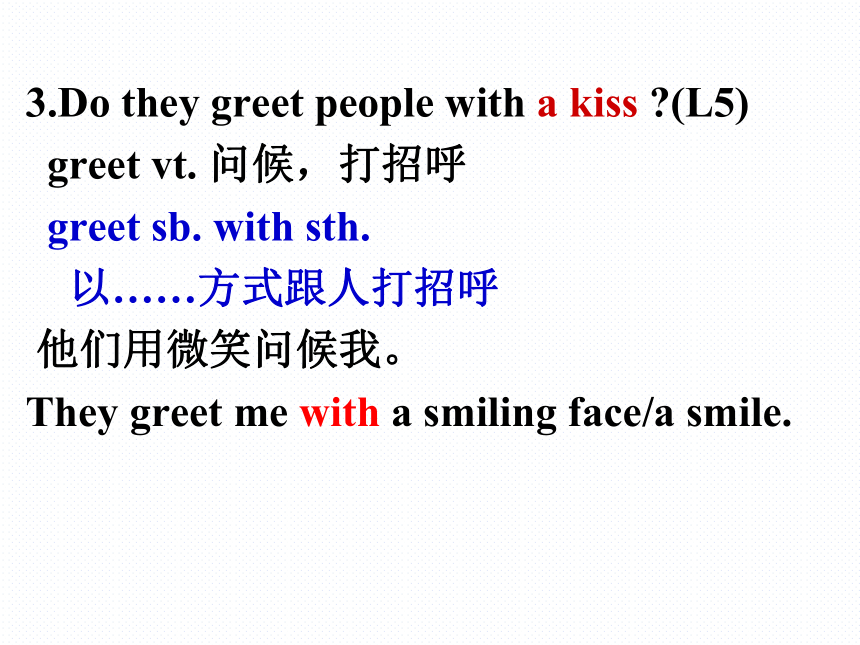
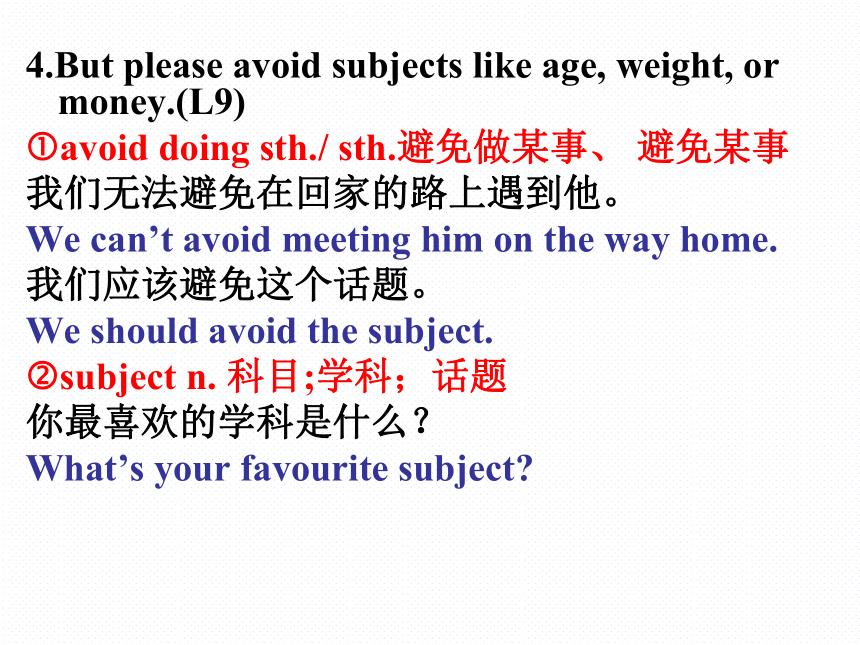
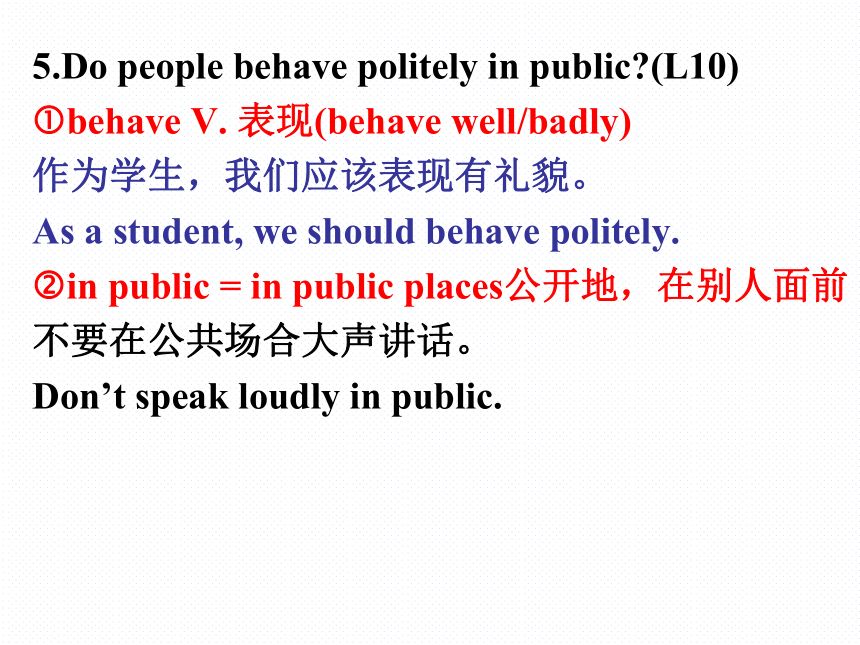
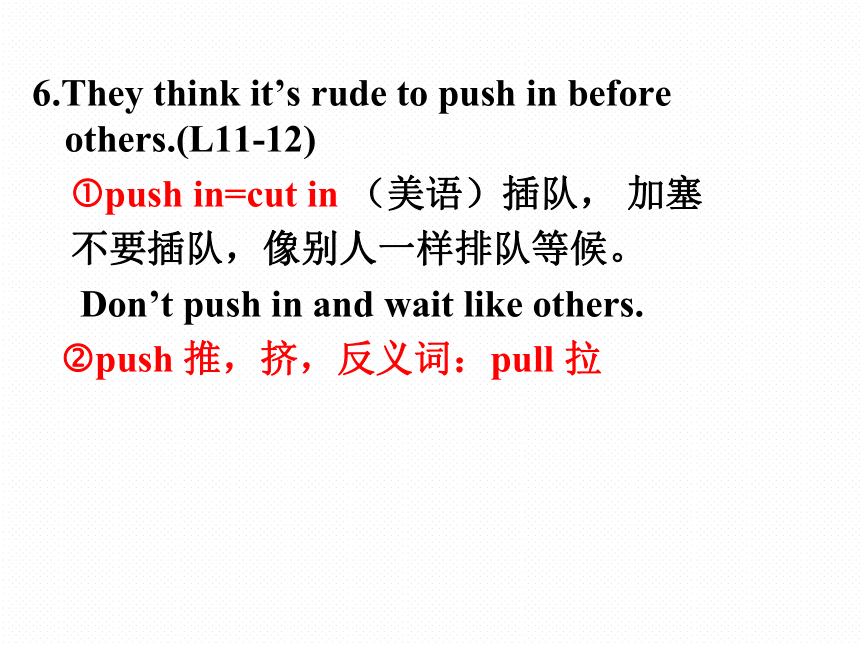
文档简介
课件22张PPT。Unit FiveReading 2
Studying aims(学习目标)①To infer meaning from key words and context
②To grasp the language points in the context
③To develop the students’ ability of reading and using English
④To make students learn more about the good manners.
Cooperative Inquiry (合作探究)Language points1.What’s the proper way to greet people there, Jenny.(L2)
the proper way to greet people there, 动词不定式作后置定语修饰名词。
Exercises:
?扎龙是观鸟的一个极好的地方。
Zhalong is a perfect place to watch birds.
?去英国旅行的最好的时间是从5月到9月。
The best time to visit the UK is from May to September.2.British people say “hello” or “nice to meet you” and shake your hand when they meet you for the first time.(L3-4)
? say “hello” to sb. 向某人问好
学生应该向老师问好。
The students should say “hello” to their teachers.
? shake sb’s hand =shake hands with sb.
他们和我握了手后就坐下了。
They shook my hand and sat down.
=They shook hands with me and sat down.
shake-shook-shaken3.Do they greet people with a kiss ?(L5)
greet vt. 问候,打招呼
greet sb. with sth.
以……方式跟人打招呼
他们用微笑问候我。
They greet me with a smiling face/a smile.
4.But please avoid subjects like age, weight, or money.(L9)
?avoid doing sth./ sth.避免做某事、 避免某事
我们无法避免在回家的路上遇到他。
We can’t avoid meeting him on the way home.
我们应该避免这个话题。
We should avoid the subject.
?subject n. 科目;学科;话题
你最喜欢的学科是什么?
What’s your favourite subject?
5.Do people behave politely in public?(L10)
?behave V. 表现(behave well/badly)
作为学生,我们应该表现有礼貌。
As a student, we should behave politely.
?in public = in public places公开地,在别人面前
不要在公共场合大声讲话。
Don’t speak loudly in public.6.They think it’s rude to push in before others.(L11-12)
?push in=cut in (美语)插队, 加塞
不要插队,像别人一样排队等候。
Don’t push in and wait like others.
?push 推,挤,反义词:pull 拉
7.They’ll say “excuse me” and be polite enough to wait till you move.(L16-17)
?till 作连词,一般情况下可以和until 互换,但till一般不用于句首
?not …until 直到…才
I didn't go to sleep until I finished my homework.
8.They'll say "excuse me" and be polite enough to wait till you move.
他们会说“打扰了”并足够耐心地等到你移开。
[指点迷津] “Excuse me.”是打扰别人时用的;“I am sorry.”是做错事或委婉拒绝别人的请求时用的。
?- Excuse me,could you tell me the way to the bookshop?劳驾,请问去书店怎么走?
?-I am sorry. I am new here.对不起。我是新来的。
?( )-_______to knock your books over.
- It doesn't matter.
A. I am sorry B. Excuse me
C. Thank you D. You are welcome
9.They'll say "excuse me" and be polite enough to wait till you move.
be +adj.+enouh + to do......
“很/足够...能做...”
他足够强壮能搬这块大石头。
He is strong enough to move the big stone.
他足够大可以上学。
He is old enough to go to school.
10.If you are in their way , they won't touch you or push past you.(L15)
if 引导的条件状语从句,主将从现。
Exercises:
翻译句子:1.如果明天不雨,我们就去野营。
2.如果我有问题,我会很快打你电话的。
If it doesn't rain tomorrow, we will go camping.
If I have some questions, I will call you soon.11.I hope so.但愿如此。
探究点:“I hope so.”表示肯定还是否定?
[指煮迷津]在英语中,某些表示想法的动词或结构后,可以接替代词so(用于肯定)和not(用于否定),用以代替前面提到的内容,这类动词和鲒构主要有:think,believe,hope,suppose, guess, imagine, expect, be afraid等。
- Will he come to the party?
他来参加晚会吗?
-I hope so.我希望他来。
-I hope not.我希望他不来。
-I don't hope so.(误)
(2) - Can you finish it in time?
你能及时完成吗?
-I‘m afraid so.恐怕可以吧。
- I'm afraid not.恐怕不行。
(3) - Is that Mary? 那是玛丽吗?
- Yes,I think so.我想是的吧。
- No,I don't think so.我想不是吧。1.邀请某人做某事
2.做某事的适当方式
3.和某人握手
4.第一次
5.以亲吻方式问候人们
6.亲密的朋友
7.与…关系亲密
8.离…近
9.开始交谈
10.避免像…的话题
11.避免做某事
12.表现有礼貌/好/坏
13.在公共场合1.invite sb. to do sth.
2. the proper way to do sth.
3.shake one’s hand
=shake hands with sb.
4.for the first time
5.greet people with a kiss
6.close friends
7.be close to sb.
8.close to
9.start a conversation
10.avoid subjects like…
11. avoid doing sth.
12.behave politely
13.in public= in public places14.插队到其他人前面 push in before others
15.撞到某人bump into sb.16.从某人身边挤过push past sb.
17.因…原谅某人 excuse sb. for sth./doing sth.
18. 你的妻子还有你都对我友好
Your wife as well as you is friendly to me.
19.一直 all the time 20.压低声音 keep one’s voice down
21.大声喊叫shout loudly
22.学到更多关于英国的礼仪
learn more about manners in the UK
23.对某人有帮助 be helpful to sb.
24.我希望如此 I hope so 25.我希望不I hope not
26.正如这谚语所流传 as the saying goes
27.偶然 意外地 by accident
28.向某人问好 say hello to sb.
29.以像…的话题开始一次谈话
start a conversation with subjects like…
Feedback Exercise
(检测反馈)用所给单词的适当形式填空。
1. What did you do after_______ (arrive) home?
2. He often invites some friends_______ (come) to his home to study at weekends.
3. If you're free, I_______ (call) you up.
4. You should speak to the old_______ (polite) here.
5. Try___________ (not be) late next time.
6.He is clever enough ________(work) out the difficult problem.arriving to comewill callpolitelynot to beto work1.他们见面时握了一下手。
They_______ _______ _______ each other when they met.
2.你们应该避免玩危险的游戏。
You should_______ _______ dangerous games.
3.昨天我意外地在街道上看到了他。
I saw him in the street_______ _______.
4.不要在公共场所吸烟。
Don't_______ _______ _______. aviod playingby accidentsmoke in publicshook hands with( )1._______,but can you tell me the way to the nearest shopping mall?
A. Excuse me B.I am sorry
C. Thank you D. You are welcome
( )2. ---Can I use your computer?
----___ I am using it now.
A. I am afraid so. B. I am afraid not.
C. I hope so. D. I hope not.
( )3. The teacher told us to do____ he did.
A. like B. as C. with D. for
( )4.I speak English after class_______.
A. neither B. also C. as well D. eitherABBC Homework
1.背诵课文;
2.完成相关练习
Studying aims(学习目标)①To infer meaning from key words and context
②To grasp the language points in the context
③To develop the students’ ability of reading and using English
④To make students learn more about the good manners.
Cooperative Inquiry (合作探究)Language points1.What’s the proper way to greet people there, Jenny.(L2)
the proper way to greet people there, 动词不定式作后置定语修饰名词。
Exercises:
?扎龙是观鸟的一个极好的地方。
Zhalong is a perfect place to watch birds.
?去英国旅行的最好的时间是从5月到9月。
The best time to visit the UK is from May to September.2.British people say “hello” or “nice to meet you” and shake your hand when they meet you for the first time.(L3-4)
? say “hello” to sb. 向某人问好
学生应该向老师问好。
The students should say “hello” to their teachers.
? shake sb’s hand =shake hands with sb.
他们和我握了手后就坐下了。
They shook my hand and sat down.
=They shook hands with me and sat down.
shake-shook-shaken3.Do they greet people with a kiss ?(L5)
greet vt. 问候,打招呼
greet sb. with sth.
以……方式跟人打招呼
他们用微笑问候我。
They greet me with a smiling face/a smile.
4.But please avoid subjects like age, weight, or money.(L9)
?avoid doing sth./ sth.避免做某事、 避免某事
我们无法避免在回家的路上遇到他。
We can’t avoid meeting him on the way home.
我们应该避免这个话题。
We should avoid the subject.
?subject n. 科目;学科;话题
你最喜欢的学科是什么?
What’s your favourite subject?
5.Do people behave politely in public?(L10)
?behave V. 表现(behave well/badly)
作为学生,我们应该表现有礼貌。
As a student, we should behave politely.
?in public = in public places公开地,在别人面前
不要在公共场合大声讲话。
Don’t speak loudly in public.6.They think it’s rude to push in before others.(L11-12)
?push in=cut in (美语)插队, 加塞
不要插队,像别人一样排队等候。
Don’t push in and wait like others.
?push 推,挤,反义词:pull 拉
7.They’ll say “excuse me” and be polite enough to wait till you move.(L16-17)
?till 作连词,一般情况下可以和until 互换,但till一般不用于句首
?not …until 直到…才
I didn't go to sleep until I finished my homework.
8.They'll say "excuse me" and be polite enough to wait till you move.
他们会说“打扰了”并足够耐心地等到你移开。
[指点迷津] “Excuse me.”是打扰别人时用的;“I am sorry.”是做错事或委婉拒绝别人的请求时用的。
?- Excuse me,could you tell me the way to the bookshop?劳驾,请问去书店怎么走?
?-I am sorry. I am new here.对不起。我是新来的。
?( )-_______to knock your books over.
- It doesn't matter.
A. I am sorry B. Excuse me
C. Thank you D. You are welcome
9.They'll say "excuse me" and be polite enough to wait till you move.
be +adj.+enouh + to do......
“很/足够...能做...”
他足够强壮能搬这块大石头。
He is strong enough to move the big stone.
他足够大可以上学。
He is old enough to go to school.
10.If you are in their way , they won't touch you or push past you.(L15)
if 引导的条件状语从句,主将从现。
Exercises:
翻译句子:1.如果明天不雨,我们就去野营。
2.如果我有问题,我会很快打你电话的。
If it doesn't rain tomorrow, we will go camping.
If I have some questions, I will call you soon.11.I hope so.但愿如此。
探究点:“I hope so.”表示肯定还是否定?
[指煮迷津]在英语中,某些表示想法的动词或结构后,可以接替代词so(用于肯定)和not(用于否定),用以代替前面提到的内容,这类动词和鲒构主要有:think,believe,hope,suppose, guess, imagine, expect, be afraid等。
- Will he come to the party?
他来参加晚会吗?
-I hope so.我希望他来。
-I hope not.我希望他不来。
-I don't hope so.(误)
(2) - Can you finish it in time?
你能及时完成吗?
-I‘m afraid so.恐怕可以吧。
- I'm afraid not.恐怕不行。
(3) - Is that Mary? 那是玛丽吗?
- Yes,I think so.我想是的吧。
- No,I don't think so.我想不是吧。1.邀请某人做某事
2.做某事的适当方式
3.和某人握手
4.第一次
5.以亲吻方式问候人们
6.亲密的朋友
7.与…关系亲密
8.离…近
9.开始交谈
10.避免像…的话题
11.避免做某事
12.表现有礼貌/好/坏
13.在公共场合1.invite sb. to do sth.
2. the proper way to do sth.
3.shake one’s hand
=shake hands with sb.
4.for the first time
5.greet people with a kiss
6.close friends
7.be close to sb.
8.close to
9.start a conversation
10.avoid subjects like…
11. avoid doing sth.
12.behave politely
13.in public= in public places14.插队到其他人前面 push in before others
15.撞到某人bump into sb.16.从某人身边挤过push past sb.
17.因…原谅某人 excuse sb. for sth./doing sth.
18. 你的妻子还有你都对我友好
Your wife as well as you is friendly to me.
19.一直 all the time 20.压低声音 keep one’s voice down
21.大声喊叫shout loudly
22.学到更多关于英国的礼仪
learn more about manners in the UK
23.对某人有帮助 be helpful to sb.
24.我希望如此 I hope so 25.我希望不I hope not
26.正如这谚语所流传 as the saying goes
27.偶然 意外地 by accident
28.向某人问好 say hello to sb.
29.以像…的话题开始一次谈话
start a conversation with subjects like…
Feedback Exercise
(检测反馈)用所给单词的适当形式填空。
1. What did you do after_______ (arrive) home?
2. He often invites some friends_______ (come) to his home to study at weekends.
3. If you're free, I_______ (call) you up.
4. You should speak to the old_______ (polite) here.
5. Try___________ (not be) late next time.
6.He is clever enough ________(work) out the difficult problem.arriving to comewill callpolitelynot to beto work1.他们见面时握了一下手。
They_______ _______ _______ each other when they met.
2.你们应该避免玩危险的游戏。
You should_______ _______ dangerous games.
3.昨天我意外地在街道上看到了他。
I saw him in the street_______ _______.
4.不要在公共场所吸烟。
Don't_______ _______ _______. aviod playingby accidentsmoke in publicshook hands with( )1._______,but can you tell me the way to the nearest shopping mall?
A. Excuse me B.I am sorry
C. Thank you D. You are welcome
( )2. ---Can I use your computer?
----___ I am using it now.
A. I am afraid so. B. I am afraid not.
C. I hope so. D. I hope not.
( )3. The teacher told us to do____ he did.
A. like B. as C. with D. for
( )4.I speak English after class_______.
A. neither B. also C. as well D. eitherABBC Homework
1.背诵课文;
2.完成相关练习
